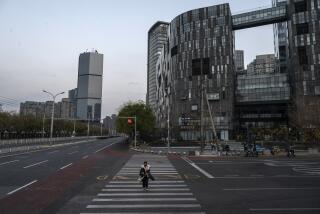In Today’s Socialist China, It’s No Crime to Be Wealthy
- Share via
FUZHOU, China — Liang Yifeng, one of socialist China’s youngest millionaires, says he’s too busy making money to think about politics.
“I don’t pay much attention to politics,” said the 31-year-old entrepreneur who in a few years has amassed a personal fortune he estimated at 2 million yuan (about $540,000).
But Liang, owner of a color-photo developing and printing service, has enough political savvy to say with assurance that in present-day China, “to be rich is a good thing.”
Liang spoke to a group of foreign reporters who visited his three-story home on a tour led by officials of the southeast coastal city of Fuzhou.
Hailed by Officials
Liang, who also heads the city Private Entrepreneurs’ Assn., was proudly introduced by the officials as a man “inspired by the policy of opening to the outside world and invigorating the domestic economy.”
China, under senior leader Deng Xiaoping, has encouraged private initiative in business in the last decade. The government acknowledges that Deng’s market-oriented reforms will mean that some people get rich faster than others.
Only a few years ago, a person with 10,000 yuan ($2,700) was considered extremely rich by Chinese standards. Now, in a nation where the average worker still earns only about 1,000 yuan ($270) a year, million-yuan earners such as Liang are increasing.
Liang, flanked by his legal adviser and a leader of the local chamber of commerce, said he started working as a mason at age 14 and had only two years of formal education.
First Photo Shop
In 1980, with $54 to his name and a Chinese Seagull-brand camera, he opened a shop to develop black-and-white pictures.
Working 13 hours a day, he expanded the business into a brightly lit color-photo shop with 15 employees on a main corner of this city of 1 million people.
He already has purchased two $35,000 Kodak automatic processing and printing machines and has imported a third machine worth $78,000.
Fuzhou officials said he is the city’s first entrepreneur to introduce foreign advanced equipment.
Lives on $270 a Month
Liang, wearing a white shirt and no tie, typical of Chinese office workers, said he has living expenses of about $270 a month and that his biggest luxury is smoking.
But last year he also completed a $81,000 home hidden down a narrow alley in the downtown area. He lives there with his father, a former glass cutter, a younger sister and about 12 shop employees to whom he gives free room and board. He is not married.
The concrete floors and walls provide a proletarian atmosphere, but the color TV and stereo in his bedroom, the chandeliers with blinking colored lights and the brass cuspidors in the stairways add a touch of luxury.
Liang said his four principles are trust, quality, customer service and obedience to the law.
4 Official Principles
The Chinese government also intones four principles of loyalty: to socialism, to Marxist-Leninist-Mao Tse-tung thought, to the dictatorship of the proletariat and to the Communist Party.
Liang insisted that there is no contradiction between the two. His wealth, he said, “has brought prosperity to society,” adding that he pays about $35,000 a year in personal and business taxes.
“No one has ever called me a capitalist,” he said.
Liang attributed his success partly to the government’s reform policies, saying: “The people of Fuzhou have a saying: ‘Thanks to Deng Xiaoping, with wine every day we can sing.’ ”
More to Read
Sign up for Essential California
The most important California stories and recommendations in your inbox every morning.
You may occasionally receive promotional content from the Los Angeles Times.









